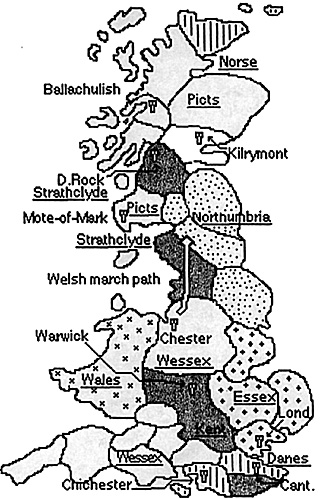
(Editor's Note: As our Dark Ages Britain campaign has drawn to a close, I am reviewing the successes and failures of each kingdom. Last issue saw me review Wessex, Essex and the Picts.)
Northumbria
Another nation that saw several players at its reins, Northumbria rode a rocky course during the campaign. Historically, Northumbria rose to dominate Britain for a century or so. In Bretwalda, it never saw that moment in the sun. Northumbria began the campaign with four provinces producing 20 income points, while its army totaled 16 detachments. After grievous losses early, Northumbria battled back to regain all four of its originals. It army numbered 13 detachments.
 Northumbria began under the control of Floridian Russell Piper, then when he lost interest, was taken over by the GM. Finally, Great Lakes member Tim Donovan assumed control. Under Russell, Northumbria warred with its historical enemy, Strathclyde, losing the province of Dumfries and a huge portion of its army in battle. Then, the Norsemen seized the city of York and its province of Deira. Under my direction, Northumbria slowly battled back, retaking both lost provinces. And finally, under Tim, Northumbria was content to play the political game, avoiding being embroiled in the war raging in the north between the Picts and Strathclyde, and in the south between Essex and Wessex, while rebuilding its strength.
Northumbria began under the control of Floridian Russell Piper, then when he lost interest, was taken over by the GM. Finally, Great Lakes member Tim Donovan assumed control. Under Russell, Northumbria warred with its historical enemy, Strathclyde, losing the province of Dumfries and a huge portion of its army in battle. Then, the Norsemen seized the city of York and its province of Deira. Under my direction, Northumbria slowly battled back, retaking both lost provinces. And finally, under Tim, Northumbria was content to play the political game, avoiding being embroiled in the war raging in the north between the Picts and Strathclyde, and in the south between Essex and Wessex, while rebuilding its strength.
Northumbria blundered early, but recouped its losses to end the campaign in a strong position. Its army was still undersized from its early defeats, but was numerous enough to prove a tough foe or good ally were it to commit to one side or the other in the battles raging around it. Because of its command changes, Northumbria was a bit of an underachiever in Bretwalda, and failed to strengthen its position.
Wales
If status quo is a victory for some, then Wales should be well satisfied with its performance. Historically, the Welsh fought many wars with the Anglo-Saxon kingdoms, sometimes on the attack, other times struggling to retain control of its land. In Bretwalda, it was a similar story. Divided into many subkingdoms, Wales began with nine provinces that produced 17 income points each year. Its armies totaled 17 detachments. Wales lost no provinces to invaders over the course of the campaign, nor did it take any. Its ending army size was 18 detachments.
Columbus native Joel Sams played the role of Owein, ruler of Gwynedd and High King of Wales. Early on, Joel was embroiled in a war with Mercia, both taking turns invading the other's territory. Eventually, Mercia was forced to sue for peace after losses to the Saxon Alliance became too great. After that, Welsh forces pretty much disappeared from the campaign. A special rule for the kingdom reflected its divided state at the time. Each winter, one of its provinces revolted. King Owein occupied himself with putting down these revolts. At the end of the campaign, a Welsh army did burst across Offa's Dyke, bypass Wessex-held Elmet, and march northwards. Unfortunately, the campaign ended before this army showed its intentions, though. It remains a mystery who it intended to attack, although the GM's suspicions are it intended to involve itself in the Pictish-Strathclyde war.
Wales' isolationist strategy throughout most of the campaign meant it passed up the opportunity to strengthen its position. However, this also kept it strength from being depleted, and a potentially difficult foe. And in light of history, a free Wales is a victory of sorts for its people.
Dal Riata
Pity, poor Dal Riata. One of my mistakes of the campaign -- I did not make them strong enough to resist their historical enemy, the Picts. If history repeated itself, they were supposed to eventually take over the Picts, forming the kingdom of Alba (which would become Scotland). Instead, in Bretwalda, they did not last six months. Dal Riata began the campaign with two provinces producing 11 income points, guarded by an army of 12 detachments.
Craig Jacobsen controlled Dal Riata. He made the initial mistake in trusting the Picts, forming a pact with them to invade their southern neighbor, Strathclyde. When the Scots marched across the border against the Britons, the Picts back stabbed them with an invasion of Dal Riata. The kingdom never recovered, losing the two tabletop battles that could have salvaged their hopes.
Dal Riata was an obvious loser in the campaign -- at no fault to its player, Craig. He was simply overwhelmed by a stronger nation. With no allies, the only way to reverse this, was victory on the tabletop. As a "long distance" player, he did not command in either of their battlefield defeats. Foreseeing this, I had made a rule that players whose kingdoms were conquered could return as a fresh Viking invasion. Thus, Craig returned, and saw some success in Bretwalda as the Danes.
More Bretwalda
Winter 816 A.D.
Spring 817 A.D.
Summer 817 A.D.
Autumn 817 A.D.
Winter 817-818 A.D.
March and April 818 A.D.
May and June 818 A.D.
Who Won? Part 1
Who Won? Part 2
Who Won? Part 3
Back to The Herald 34 Table of Contents
Back to The Herald List of Issues
Back to MagWeb Master Magazine List
© Copyright 2000 by HMGS-GL.
This article appears in MagWeb (Magazine Web) on the Internet World Wide Web. Other military history articles and gaming articles are available at http://www.magweb.com